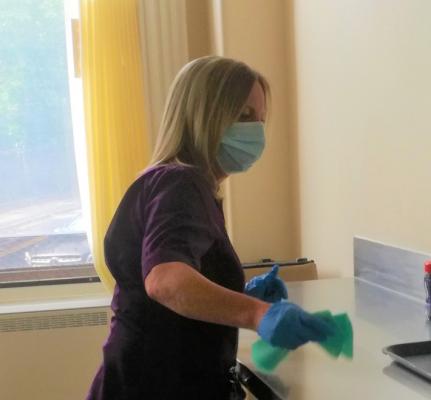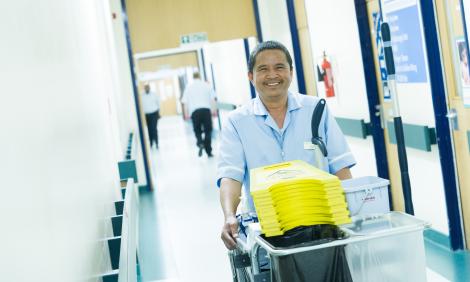Domestic services staff
Domestic services staff are the lifeblood of the NHS, keeping hospitals, health centres, offices and other areas clean and hygienic.
Working life
Domestics services staff work across all areas of the NHS, making sure that all areas are clean and safe places where staff can care for patients while reducing the risk of infection.
Domestic services staff work at different levels, including domestic services assistant, supervisor and manager.
As a domestic services assistant (or domestic assistant) you will carry out the cleaning. This could include:
- dusting
- using spray cleaners
- cleaning hard floors with mops or electric floor cleaners
- using vacuum cleaners or carpet cleaners
- cleaning toilet and bathroom areas
You'll do with routine cleaning which needs to be done on a daily or weekly basis as well as emergencies such as spills. You may also carry out regular, planned deep cleaning on a monthly or annual basis.
If you work as a domestic services supervisor, you'll oversee the work of a team of domestic assistants. You will allocate work to make sure all the cleaning is carried out where and when it is needed. You also make sure staff are available for routine cleaning as well as unexpected emergency situations.
As a domestic services manager, you are responsible for planning and organising the cleaning operations for a hospital or department. You will have other management tasks such as:
- recruiting and training staff
- arranging staff rotas
- making sure all cleaning meets quality standards
- managing absence and discipline
- controlling budgets
Paula Dainty
Facilities management assistant
Read Paula's storyThe best bit is knowing I'm helping the patients, staff team and visitors by keeping every area clean for them.

Pay and conditions
Domestic services staff working in the NHS are paid on the Agenda for Change (AfC) pay system. As a new entrant you would typically start on AfC band 2. With further training and experience, you could apply for housekeeper or team leader positions at higher points on band 2 and domestic services team manager at band 3.
Domestic services staff usually work standard hours of around 37.5 a week. They may work shifts, which could involve nights, early starts, evenings and weekends.
Terms and conditions will usually be different for domestic services staff working outside of the NHS.
Who will I work with?
Cleaners and domestic services assistants are likely to have a lot of contact with patients, depending on where they work. Supervisors and team leaders may have some contact with patients. Managers may have little or no patient contact.
Entry requirements
There are no set entry requirements for domestic services assistants. Employers expect a good standard of numeracy and literacy. They may ask for GCSEs in English and maths. Employers may also ask for relevant qualifications such as an NVQ in hotel services or health care. They may also ask for relevant experience
Employers may ask for some experience of hotel work or healthcare which could be from paid or voluntary work.
Domestic services supervisors have usually worked as cleaners or domestic assistants. This may be with the NHS or elsewhere. Employers usually ask for relevant qualifications in cleaning and/or team leadership.
Domestic services managers may:
- enter the NHS with a relevant qualification and/or experience. This could be a degree or HND in facilities management or hotel services for example. They may have experience from working outside the NHS
- join the NHS as a domestic services assistant or team leader and become managers by training and promotion
Skills needed
Domestic services assistants need to:
- be physically fit
- follow instructions and procedures
- pay attention to detail
- work as part of a team
- take responsibility for their own work
- be able to work unsupervised
They also need
- organisation skills
- teamwork skills
Training and development
When you start work as a domestic assistant, you will be given the training you need. This includes health and safety and manual handing as well as an introduction to the department. You will be encouraged to work towards a qualification, such as an NVQ in cleaning or one of the qualifications offered by the British Institute of Cleaning Science (BICSc). You may also have the opportunity to get a qualification by doing an apprenticeship.
Employers may ask staff to take courses in particular topics such as dealing with hazardous waste or infection control.
Domestic services supervisors and managers may be expected to take qualifications in management.
With experience and qualifications, domestic services staff can apply to become members of the British Institute of Cleaning Science (BICSc).
Where the role can lead
With experience, a domestic services assistant could become a team leader, supervising a team of assistants. With further experience, they could progress to become a manager, responsible for a department or area.
Domestic services staff could move into other areas such as facilities management, hotel services management or housekeeping.





